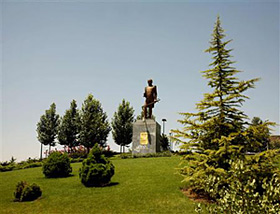 |
 |
 |
 News from Around the Americas | July 2006 News from Around the Americas | July 2006  
Iran and Venezuela Team Up as Anti-US "Odd Couple"
 Christian Oliver - Reuters Christian Oliver - Reuters


| | Statue of Venezuelan hero, Simon Bolivar (1783-1830), stands in a park in Tehran July 5, 2006. To deserve a statue in central Tehran, you normally need to be an 11th-century Persian poet. However, Venezuela's 19th-century independence leader Simon Bolivar surveys passers-by in Goftogou Park. (Reuters/Morteza Nikoubazl) |
Tehran - To deserve a statue in central Tehran, you normally need to be an 11th-century Persian poet. However, Venezuela's 19th-century independence leader Simon Bolivar surveys passers-by in Goftogou Park.

Venezuelan President Hugo Chavez, wearing the checkered headscarf of the Basij volunteer Islamic militia, stressed the cordiality of Tehran-Caracas relations when he unveiled the statue of his hero on an icy November day in 2004.

Right-wing Venezuelan and U.S. media have attacked Chavez' growing ties with Tehran. In their most fanciful conspiracy theory, Iran is planning to ship nuclear warheads to Venezuela in a re-run of the 1962 Cuban missile crisis.

In 2003, U.S. concerns that Arab money-launderers on the Venezuelan island of Margarita could help terrorists mushroomed into unsubstantiated charges that Iranian-backed Hizbollah fighters had set up training camps there.

Venezuelan officials have robustly denied such sinister dimensions to the Tehran-Caracas axis. So how do these two anti-U.S. governments benefit from closer ties?

At first glance, Chavez and his Iranian counterpart Mahmoud Ahmadinejad seem to be like-minded partners: Two ex-military OPEC price hawks who are lavishing their petrodollars on the poor majority long neglected by their countries' rich elites.

Iran is increasingly courting the 114-nation Non-Aligned Movement (NAM) for leverage in a dispute over its atomic work, arguing that it is only the United States and Western European countries that reckon Tehran is seeking nuclear missiles.

"It would be terribly useful for Iran to get NAM on its side as that makes the Europeans very nervous," said Patrick Clawson of the Washington Institute for Near East Policy.

NAM stalwart Venezuela was one of only three countries to vote against referring Iran to the U.N. Security Council at the International Atomic Energy Agency meeting in February.

Officials and analysts say this was a symbolic act in a vote the United States and its allies were always going to win. Deep down, they argue, there are clear limits to how close Caracas and Tehran can afford to become.

"What is a vote in the agency? Nothing. The Venezuelans know the real red line with Iran is arms. They both say they will repel any U.S. attack but they cannot join up on weapons," said a Latin American ambassador in Tehran.

The envoy said Caracas knows not to push its chief oil customer, the United States, too far, mentioning how quickly Defense Minister Orlando Maniglia cooled speculation in May that Venezuela could sell its old F-16 jet-fighters to Iran.

The United States slapped arms sanctions on Venezuela in May, partly because of Chavez's relations with Iran which Washington accuses of bankrolling terrorism. Venezuela is looking primarily to Russia for its weapons.

OPEC FOUNDER MEMBERS

Iran and Venezuela, the world's nos. 4 and 5 oil exporters, forged their friendship in the 1960s as founder members of the Organization of Petroleum Exporting Countries.

"I would say OPEC is at the heart of the relationship. There is a downward pressure on prices and the Iranians and Venezuelans are nervous," Clawson said.

Venezuela and Iran, which both have big reserves but have experienced difficulties exploiting them, view world oil markets as oversupplied by about 1 million barrels per day.

Iran is also investing in Venezuela. Iran Khodro, the Middle East's biggest car manufacturer, is planning to build its Samand model there and oil firm Petropars has signed a deal to measure and certify oil reserves in the Orinoco Belt.

Iranian firms are producing tractors and cement in the Caribbean state. Iran's Industry Ministry says $1 billion has been invested so far in Venezuelan projects.

Beyond the economics, Chavez and Ahmadinejad look like strange bedfellows.

"All they seem to have in common is a visceral hatred of the United States," said Ali Ansari, Iran expert at Scotland's St Andrews University. "There is no real emotional tie, if Chavez were a Muslim that would make life a lot easier."

"Ahmadinejad's sphere is the Muslim world."

Not accepting Israel's right to exist is an ideological crux of Iranian foreign policy. Venezuela has diplomatic ties with the Jewish state.

Iran's foreign policy priorities are traditionally Islamic and Ahmadinejad's populism is ideologically a world apart from Chavez's.

Chavez has focused spending on his support base in the shanty towns. In Iran, budget increases have often gone to shadowy religious foundations.

"Ahmadinejad has the populist rhetoric, but there is no plan. Where are the new irrigation systems, roads and railways? The oil money is a sort of patronage," Ansari said.

When asked how Chavistas, with their sense of being elected by the people, can ally themselves closely with a country where candidates are selected by the clerical high guard, a senior Venezuelan official said: "Relations are not spotless."

"We believe the relationship is important because of the need for a counter-weight to North American imperialism. But we also sincerely believe in a strong European Union, a strong Russia and a strong China," he added. | 
 | |
 |



